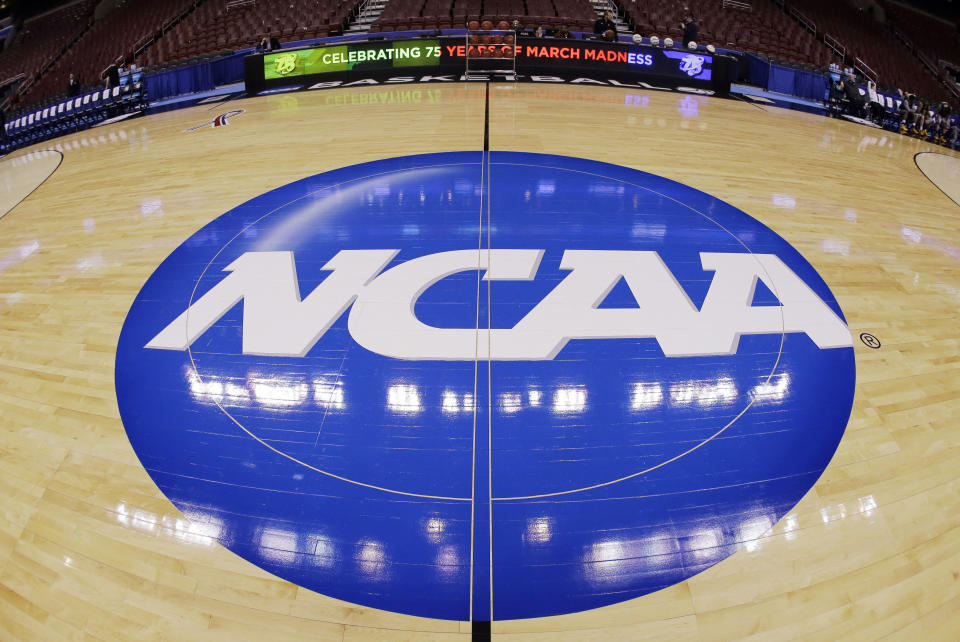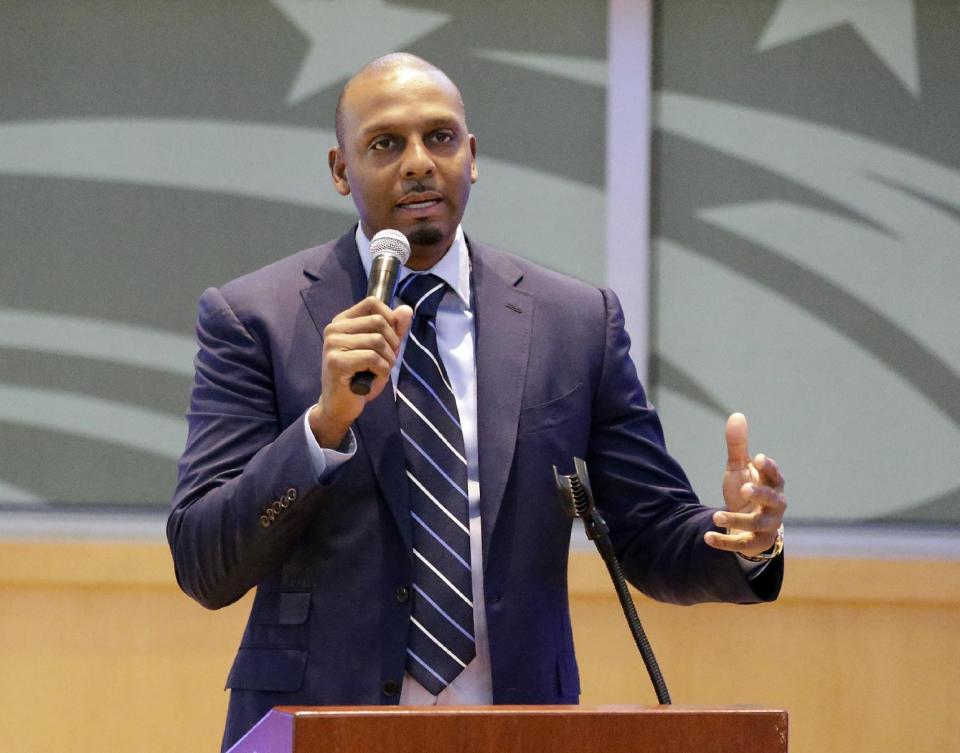Top recruits react to massive scandal: 'There's a dark side to everything'
COLORADO SPRINGS, Colo. – Zion Williamson corralled a turnover on a full-court press and launched himself toward the basket with a violent grace. He spun his 6-foot-7, 230-pound frame after takeoff and crashed home a 360-degree dunk that encapsulated his boundless potential. Gasps of awe echoed through the gym at the USA Basketball Junior National Team minicamp on Sunday afternoon, another moment of wonder from the top American-born basketball recruit in 2018.
USA Basketball hosted 54 of the country’s top prospects this weekend, the first scene of the changed recruiting landscape in the wake of the federal basketball probe. As Williamson shined on the court, an undercurrent of uncertainty, innuendo and speculation buzzed off it. With a majority of the country’s top American players from the classes of 2018, 2019 and 2020 here, the ecosystem that exists around top prospects has been shaken after a sweeping federal investigation into basketball’s underbelly resulted in 10 arrests. “It was crazy,” Williamson said of the news. “But you hear it a lot, they say, ‘This is a business.'”
How much will the business of basketball change in grassroots, high school and recruiting? That question rippled through the dozens of parents, handlers, sneaker reps, summer basketball coaches and high school coaches who surrounded the court in Colorado Springs this weekend. The arrest of four assistant coaches from major college programs, a grassroots basketball coach and two Adidas executives have shrouded the scene in ambiguity.
“I just feel like Adidas, Nike and Under Armour, whatever they’re doing, they’re all doing the same thing, whatever it is,” said Lee Anderson, Williamson’s stepfather who coached his son’s Adidas-sponsored summer basketball team. “Adidas just happened to have been called out. I’m sure Nike is going to be called out. I’m sure Under Armour could possibly be called out. It doesn’t affect how we look at Adidas, Nike or Under Armour. That’s just the way that the culture is right now.”
Few people interviewed here expressed surprise at the allegations in the case – conspiracy, bribery and wire fraud. The prevailing feeling around the sport is that cash deals and steering players to schools have long been standard practice at the grassroots basketball level. How will basketball’s flawed culture change?
There are questions on every level.

RECRUITS
Romeo Langford is a graceful 6-foot-6 shooting guard in the Class of 2018 from New Albany, Indiana. He’s a top 10 prospect in the Rivals.com rankings, a prototype to star in college basketball and beyond. He’s played for Adidas-sponsored travel teams, and his list of potential schools includes Kansas, Indiana, UNC, UCLA and Vanderbilt.
Langford eliminated Louisville from his list after the revelation in federal paperwork that Cardinals coaches helped orchestrate a $100,000 deal through Adidas to sign recruit Brian Bowen. That news led to the ouster of coach Rick Pitino. “I really don’t want to go to a school that’s doing illegal stuff,” he said. “I want to make sure that everything is clean. That’s the main thing with my family, make sure everyone is straight up, not lying or not having anything happen behind closed doors.”
Langford also didn’t register much surprise: “I just felt like that’s everywhere in college basketball. Louisville is the one that got caught first.”
The news hit harder to 2018 guard Anfernee Simons, a top-20 guard from IMG Academy who’d been committed to Louisville before Pitino’s firing. He’d built a strong relationship with Pitino, speaking with him on the phone every week. “It’s been pretty crazy, a little emotional and stuff,” he said. “Everything happens for a reason, I guess.”
Simons has a broken wrist, but attended the USA Basketball event even though he couldn’t participate. He said he’s planning on rebooting his recruitment soon, with trust in the head coach the biggest factor. He sighed when summing up the situation: “There’s a dark side to everything.”
Jahvon Quinerly, a top 2018 point guard from New Jersey, is the recruit most directly involved in the federal investigation. The wiretaps reveal that Arizona assistant Emanuel “Book” Richardson brokered a deal with a middleman and financial planner to obtain $15,000 to secure Quinerly’s commitment to the Wildcats. Quinerly didn’t comment when asked if he or his family took money, revealing only that he’s hired an attorney and his family hasn’t been contacted by anyone from the federal government. He said he’ll remain committed to Arizona “for now” and summed up the investigation this way: “It’s unfortunate. It’s crazy.”
HIGH SCHOOL
Anfernee “Penny” Hardaway was the top recruit in the high school class of 1990. While he made a cameo in the movie “Blue Chips” about corrupt basketball recruiting, he says his high school recruiting didn’t play out the same way. “I was so in love with Memphis, I didn’t entertain anything else,” he said. “I didn’t get approached by colleges saying, ‘I’ll give you this.’ It wasn’t a ‘Blue Chips’ deal. I heard and always heard. Never knew if it was true.”
Hardaway coaches high school and AAU back in his native Memphis after a decorated career that included more than $120 million in NBA salary. Life has come full circle, as he’s now coaching top-five forward James Wiseman, a Class of 2019 standout at Memphis East and for Team Penny on the Nike EYBL circuit. He says his advice to the Wiseman family will be simple: “Don’t take anything. You don’t want to jeopardize James in any way, shape or form.”

Hardaway says he hopes that this scandal brings the topic of paying college athletes to the forefront and bring positive change to the sport. “I hope it brings that topic up,” he said at USA Basketball, where he worked as a court coach. “Most of the kids that go to college on scholarship can’t afford to buy clothes to go to the college.”
DeMatha Catholic coach Mike Jones worked with Hardaway at USA Basketball. DeMatha, which is in Hyattsville, Maryland, is one of the country’s most fabled programs, annually sending its starting five and a few bench players off to college on Division I scholarships. (No. 1 NBA draft pick Markelle Fultz is a recent graduate). Jones hopes the federal investigation can yield positive change, but only if there’s a baseline understanding of the realities of amateur basketball. He said things will not change “if people are naïve enough to think this doesn’t go on, and that was a rarity and it just started.”
If the summer basketball paradigm does change, Jones suggested that this could “give some power back to the high schools and high school coaches.” He added: “I’m never one who is going to suggest all high school coaches are good, and all summer coaches are bad. That’s totally not the case. In high school, we play under rules and regulations. Our kids have to achieve a standard in the classroom to play. There’s a lot of differences that I think are good for the game that should be emphasized.”
GRASSROOTS
Rod Hampton is the father of R.J. Hampton, one of the top point guards in the class of 2020. Rod Hampton said he just finished the first year of a three-year contract from Adidas to coach his son’s team, Texas Basketball Unlimited. He declined to give the financial terms, but it’s become common for parents of top prospects to land deals from sneaker companies to coach summer basketball teams.
Hampton, who played at SMU, works as a logistics consultant by day. He also runs a side business training players. He said he doesn’t see the federal investigation slowing down the business of grassroots basketball. “At the end of the day, we all say it’s a dirty game,” he said. “I don’t think it’s going to stop. But there’s going to be people held accountable for wrongdoing and it’s going to not be limited to one. The playing field has been leveled.”
He said he has no ill feelings toward Adidas after news of the arrest of two of its top executives in the federal probe. He said he has no plans to leave Adidas, but admits he’s held a few meetings in case Adidas pulls out of grassroots in the wake of the scandal. “Nothing but goodwill,” he said. ‘I hope it’s back in full force.”
Zion Williamson’s stepfather, Lee Anderson, said he feels similarly about Adidas. He said he hasn’t heard from anyone from the company since the scandal broke, but he also said that’s not surprising because Williamson will be heading to college this summer instead of the grassroots circuit. “It’s a complicated world,” he said. “It’s the shoe companies that have the work to do. They’re trying to build relationships with people so when that time does come after college [to sign a contract] they’re going to have relationships with those guys.”
FUTURE
As Zion Williamson sat on a bleacher on Sunday afternoon conducting an interview, his 4-year old brother, Noah, chased a ball around one of the side courts at the USA Basketball facility. Noah wore hightop Adidas shoes, attempting to dribble a ball that came up to his waist. “He’s going to be the next Chosen One,” Zion said of his little brother. “You heard it here first.”
It will be a few years before Noah potentially heads out on the grassroots circuit. And the only certainty of these unsettled times in the recruiting landscape is that things will likely look a lot different by then.
More popular stories on Yahoo Sports:
• CBS clarifies report on Kaepernick standing for anthem
• Vice president leaves Colts game over anthem ‘disrespect’
• Beckham Jr. carted off in tears after ugly ankle injury

